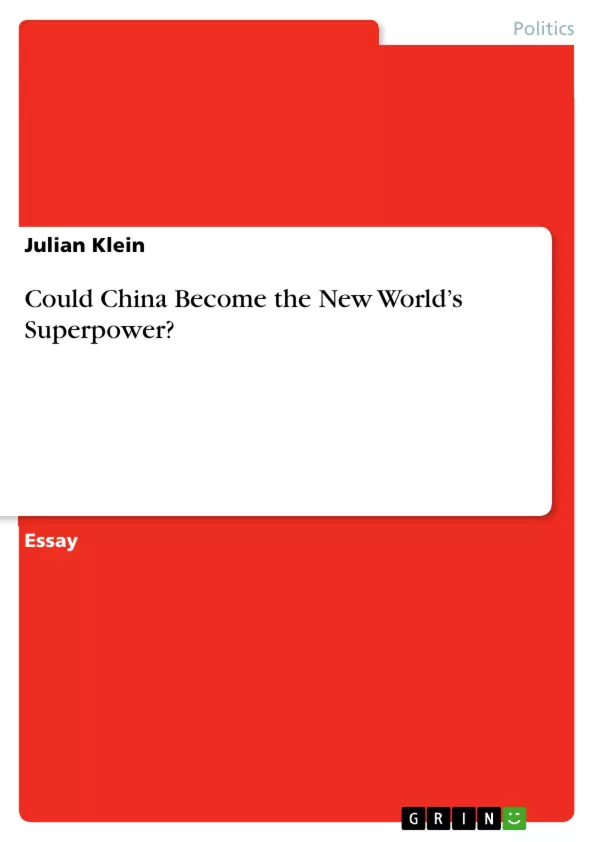This paper has four primary aims; firstly, it explains the requirements a country needs to be called a superpower. Secondly, it analyses whether China fulfils the criteria of a superpower, as defined in the first section. Thirdly, it analyses the costs of such an enormous development. Lastly, this essay synthesizes the data points to answer the leading question; could China become the new world superpower?
China’s emerge as a dominating world power is not unprecedented by any means. In a period of only a few decades, China has transformed into the global centre of economic activity, through increased production and investments, as well as reformed import and export policy. These advancements are confirmed on a daily basis by reports on China’s skyrocketing growth and prosperity. China is easily regarded as the country of the future. Nevertheless, this phenomenon begs the question, how can the West better understand China’s rapid development, especially when Western countries lack a basic understanding of this side of the world?
Table of Contents
- Preface
- Introduction
- Definition of Superpower
- China's Economic Power
- China's Political Power
- China's Military Power
- Critics of China's Development
- Résumé
Objectives and Key Themes
This paper aims to analyze whether China meets the criteria of a superpower, considering its economic, political, and military capabilities. It also explores the costs associated with China's rapid development and ultimately assesses the possibility of China becoming the new world superpower.
- China's economic growth and its global impact
- The definition and criteria of a superpower
- Analysis of China's political and military influence
- Challenges and criticisms surrounding China's rise
- Potential implications of a bipolar world order
Chapter Summaries
Preface: This preface introduces the author's motivation for studying China's rise, highlighting the lack of Western understanding of the country's rapid development. The author explains their decision to study at Beijing Foreign Studies University (BFSU) to gain firsthand knowledge and maintain a neutral perspective. The preface sets the stage for a balanced exploration of China's potential to become a superpower, emphasizing the need for a nuanced understanding of its historical context and recent economic and political shifts.
China's Economic Power: This chapter details China's remarkable economic transformation from a poverty-stricken nation to the world's second-largest economy. It contrasts China's past economic struggles with its current status as a major manufacturing hub and exporter, emphasizing the significant growth in GDP and foreign direct investment. The chapter analyzes China's integration into the global economy through participation in free trade agreements and membership in the WTO, discussing both its successes and challenges, such as trade tensions with the US. The chapter also highlights China's substantial investments abroad, particularly in Africa, as a means of expanding its global influence and achieving the goals of the “One Belt, One Road Initiative”.
Keywords
China, superpower, economic development, political power, military power, global influence, economic growth, trade, foreign investment, WTO, "One Belt, One Road Initiative", bipolar world order.
Frequently Asked Questions: China's Rise as a Superpower
What is the main topic of this document?
This document provides a comprehensive overview of China's potential to become a superpower. It analyzes China's economic, political, and military capabilities, explores the challenges and criticisms associated with its rapid development, and assesses the implications of a potential bipolar world order.
What topics are covered in the Table of Contents?
The Table of Contents includes a Preface (with an Introduction and Definition of Superpower), China's Economic Power, China's Political Power, China's Military Power, Critics of China's Development, and a Résumé.
What are the main objectives and key themes of the analysis?
The main objective is to analyze whether China meets the criteria of a superpower. Key themes include China's economic growth and global impact, the definition and criteria of a superpower, China's political and military influence, challenges and criticisms surrounding China's rise, and the potential implications of a bipolar world order.
What does the Preface discuss?
The Preface explains the author's motivation for studying China's rise, highlighting the lack of Western understanding of its rapid development. It details the author's decision to study at Beijing Foreign Studies University (BFSU) to gain firsthand knowledge and maintain a neutral perspective. It sets the stage for a balanced exploration of China's potential to become a superpower.
What is discussed in the chapter on China's Economic Power?
This chapter details China's economic transformation, from poverty to the world's second-largest economy. It examines China's role as a manufacturing hub and exporter, its GDP growth, foreign direct investment, integration into the global economy (including participation in free trade agreements and the WTO), trade tensions (e.g., with the US), and significant investments abroad (particularly in Africa) through initiatives like "One Belt, One Road".
What keywords are associated with this analysis?
Keywords include China, superpower, economic development, political power, military power, global influence, economic growth, trade, foreign investment, WTO, "One Belt, One Road Initiative", and bipolar world order.
What type of audience is this document intended for?
The document is intended for an academic audience interested in analyzing the themes of China's rise and its potential to become a global superpower. The information is presented in a structured and professional manner, suitable for academic research and analysis.
Where can I find more detailed information on China's political and military power?
The provided HTML only contains summaries. The full text of the document would provide detailed information on China's political and military power.
What is the overall conclusion of the document (as far as it can be gleaned from the summary)?
The document does not provide an explicit overall conclusion in this summary. A complete version would likely offer a comprehensive assessment of China's potential to become a superpower, weighing its strengths and weaknesses.
- Quote paper
- Julian Klein (Author), 2019, Could China Become the New World’s Superpower?, Munich, GRIN Verlag, https://www.grin.com/document/946853



